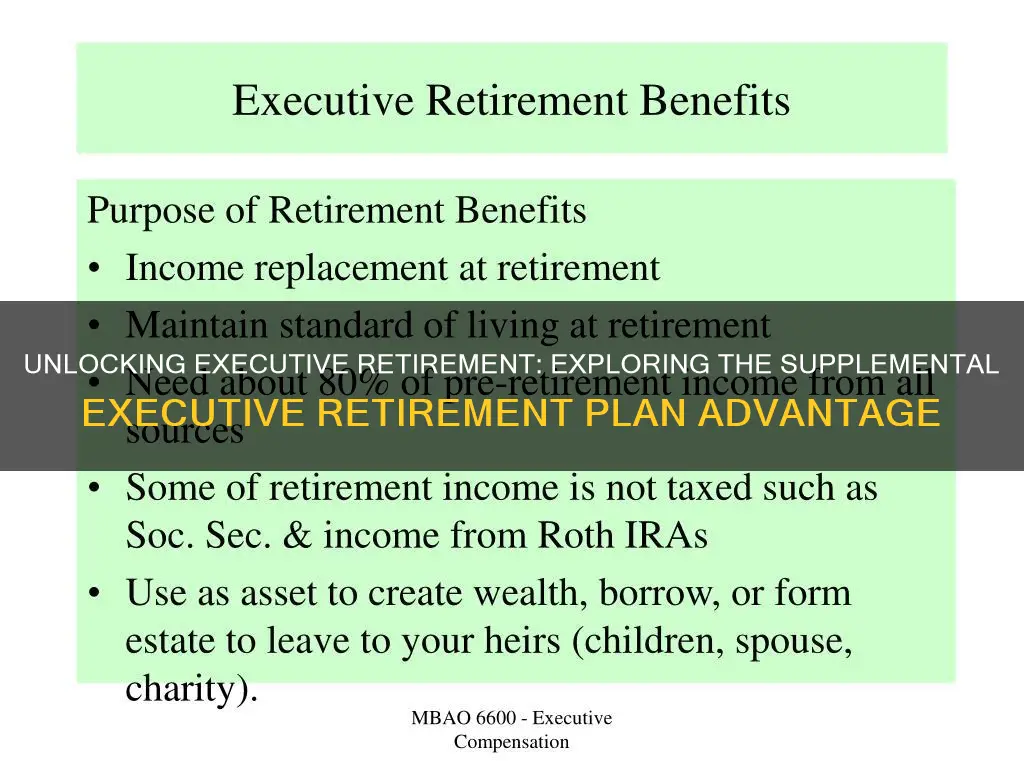
A Supplemental Executive Retirement Plan (SERP) is a set of benefits offered by companies to top-level employees, such as CEOs, CFOs, and high-ranking officials, in addition to their standard retirement savings plan. SERPs are a form of deferred-compensation plan, which means they are not qualified for special tax treatment like a 401(k) plan. SERPs are used by companies to attract and retain key talent and by employees to increase their retirement savings.
| Characteristics | Values |
|---|---|
| Purpose | Provide additional compensation for key employees and persuade them to remain with the company longer |
| Type of plan | Non-qualified deferred compensation plan |
| Who is it for? | Company's key employees, including CEOs, CFOs and high-ranking officials |
| Funding | Cash flow, investment funds or a cash-value life insurance policy |
| Taxation | Tax-deferred; taxed as regular income when withdrawn |
| Withdrawal | No early withdrawal penalty; can be withdrawn as a lump sum or in monthly disbursements |
| Vesting | Graded or cliff vesting |
What You'll Learn
- SERPs are a good option if you've maxed out your IRA and 401(k)
- SERPs are non-qualified plans, so no 10% tax penalty if you withdraw before age 59.5
- SERPs can be funded by the company's cash flow or a life insurance policy
- SERPs are easy to put together and require little management
- SERPs are a good way to reward and retain key executives

SERPs are a good option if you've maxed out your IRA and 401(k)
A Supplemental Executive Retirement Plan (SERP) is a deferred compensation agreement between a company and its key executives. SERPs are a good option for those who have maxed out their IRA and 401(k) because, unlike those plans, SERPs do not have contribution limits. This means that, if you are in a position to do so, you can contribute as much as you like to your SERP, which can result in a substantial retirement payout.
SERPs are also advantageous because they are non-qualified retirement plans, meaning they are not subject to the same rules as 401(k)s and IRAs. For example, SERPs do not have to be offered to all employees, and they do not have an early withdrawal penalty. SERPs are also highly customisable, allowing executives to negotiate the terms of their individual package.
Another benefit of SERPs is that they are funded by the company, either out of cash flows, investment funds, or a cash value life insurance policy. This means that, unlike with a 401(k) or IRA, employees are not obligated to defer their salary or bonus money into the plan each year.
Finally, SERPs can be a good option for those who have maxed out their 401(k) or IRA because they can be used as a way to retain key executives. Companies may be more willing to negotiate a SERP as part of an employee's compensation package if they are hoping to incentivise that employee to remain with the company long-term.
Restaurant Investment: Worth the Risk?
You may want to see also

SERPs are non-qualified plans, so no 10% tax penalty if you withdraw before age 59.5
A Supplemental Executive Retirement Plan (SERP) is a non-qualified plan, meaning it is not subject to the same rules as a qualified retirement plan like a 401(k). One of the key advantages of a SERP is that there is no 10% tax penalty for early withdrawals before the age of 59.5, unlike with qualified plans. This gives the employee greater flexibility to access their funds without incurring a financial penalty.
SERPs are designed as an additional benefit for top-level employees, on top of the standard retirement savings plan offered by the company. They are used by companies to attract and retain key executives, and as such, they are not required to be offered to all employees. SERPs can be tailored to meet the specific needs of each covered employee, and there is no limit on the amount that can be contributed, so the retirement payout can be substantial.
The non-qualified nature of SERPs also means that they require no approval from the IRS and minimal reporting. Companies have control over the plan and can book an annual expense equal to the present value of the future benefit payments. When benefits are paid out, the company can deduct them as a business expense.
For employees, one of the main benefits of a SERP is the ability to defer compensation and accumulate funds on a tax-deferred basis. While taxes will need to be paid on the funds upon withdrawal in retirement, the employee is not obligated to contribute any of their salary or bonus to the plan each year. The tax-deferred nature of SERPs also means that there are no current tax consequences for the executive, and any beneficiaries will be able to receive a lump-sum payment or annuity income in the event of the executive's death.
In summary, SERPs offer a range of advantages for both companies and employees, including the flexibility to access funds early without incurring a 10% tax penalty. However, it is important to carefully consider the potential risks and tax implications of a SERP before deciding if it is the right choice for your retirement strategy.
The Workforce Investment Act: Funding America's Future
You may want to see also

SERPs can be funded by the company's cash flow or a life insurance policy
A Supplemental Executive Retirement Plan (SERP) is a non-qualified deferred compensation plan offered to a company's key employees, including CEOs, CFOs, and high-ranking officials. SERPs are used to attract and retain top talent and are typically packaged with health insurance, life insurance, or stock options. Companies can fund SERPs through their cash flow or by taking out a life insurance policy on the employee.
Funding SERPs with Company Cash Flow
SERPs can be funded by the company's cash flow, allowing them to invest in a fund that the employee will subsequently own. This provides flexibility in how the benefits are paid out, either as a lump sum or a series of installment payments upon retirement.
Funding SERPs with Life Insurance Policies
Another option for funding SERPs is through life insurance policies taken out on the lives of key employees. The company purchases a life insurance policy sufficient to provide the agreed-upon future benefits. The company pays the premiums, owns the policy, and is the policy beneficiary. The policy cash values grow tax-deferred, providing the company with access to tax-advantaged funds.
At retirement, the key executive receives supplemental income based on the terms of the agreement. In the event of the employee's death, the policy's death benefit is payable to the company, which can be used to provide continued supplemental benefits or a lump-sum benefit to the employee's beneficiary.
Advantages of Funding SERPs with Life Insurance Policies
Funding SERPs with life insurance policies offers several advantages to both the company and the key executives. For the company, life insurance policies provide:
- Tax-deferred accumulation within the policy.
- The potential to structure the policy to allow cost recovery.
- Ownership and control over the policy and its cash value.
For key executives, life insurance-funded SERPs offer:
- The ability to custom design the plan to meet specific needs.
- Accumulation of supplemental retirement income without upfront taxes.
- Death benefits available to fund the plan and provide a lump-sum benefit to the beneficiary, subject to the agreement's terms.
Art Investments: Why the Hype?
You may want to see also

SERPs are easy to put together and require little management
A Supplemental Executive Retirement Plan (SERP) is a set of benefits that companies may offer to top-level employees in addition to their standard retirement savings plan. SERPs are non-qualified retirement plans, meaning there is no special tax treatment for the company or the employee.
The company can fund the SERP out of its current cash flows or through the funding of a cash-value life insurance policy. In the latter case, the company benefits from tax-deferred accumulation inside the policy and can usually structure the policy to allow it to recover its costs.
For executives, the plan can be tailored to meet specific needs, and there are no current tax consequences. Death benefits are also available, which can provide continued periodic payments or a lump-sum payment to the family in the event of the executive's death.
SERPs can be an effective way for companies to incentivize and retain key executives, and for executives to increase their retirement savings.
Gamestop: The People's Stock
You may want to see also

SERPs are a good way to reward and retain key executives
Supplemental Executive Retirement Plans (SERPs) are a good way to reward and retain key executives. SERPs are a set of benefits that companies may make available to top-level employees in addition to those covered in the company's standard retirement savings plan. They are a form of deferred-compensation plan and are often used to incentivise key executives to remain with the company long-term.
SERPs are non-qualified retirement plans, meaning they are not subject to the same restrictive federal regulations and tax laws that govern qualified retirement plans, like 401(k) plans. This means that companies can offer SERPs selectively to key executives, who might otherwise be limited by maximum contribution rules set by the IRS. SERPs also have no contribution limit, so companies can offer substantial retirement payouts to executives.
SERPs are attractive to key executives because they can be customised to meet specific needs. Executives can negotiate the terms of their package, including the age of distribution and whether they receive a lump sum or a series of payments. SERPs also offer tax advantages to employees, as taxes are not paid on contributions until retirement.
SERPs are also beneficial to companies as they are easy to put together, require little management, and do not need approval by the IRS. Companies can also recover their costs through the structure of the life insurance policy, and they receive a tax deduction when benefits are paid out.
Pay Off the House or Invest: Where Should Your Money Go?
You may want to see also







